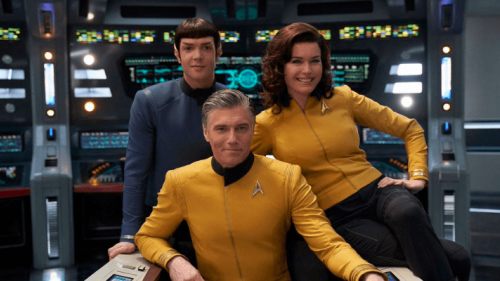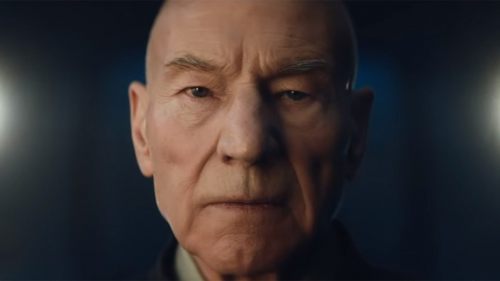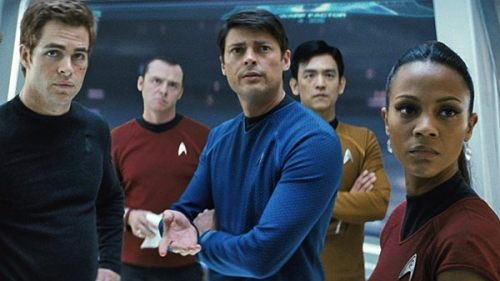No Pressure, But I Need STAR TREK: DISCOVERY To Save The World
It was the Leslie Jones story that broke me. Jones had come under attack by right wing forces on the internet for the triple crime of being black, being a woman and being in the new Ghostbusters, and the Joseph Goebbels of the anime love pillow set, Milo Yiannopolous (I’m not even looking up how to spell his last name properly) sicced his horde of “Alt-Right,” sexist, racist GamerGaters on her. When she fought back Milo had his Twitter account permanently banned (we are for sure at middle school level with this shit), but that wasn’t the end of it. Earlier this week, seemingly in revenge for Milo’s banning, a group of horrific scumbags hacked Jones’ cloud storage and her website, and they placed her nude photos, her driver’s license and personal info and a video of the schlock, racist meme gorilla Harambe on her site.
Leslie Jones: black, female, unwilling to back down in the face of abuse, and this is what happened to her. Something inside of me broke that day, some last shred of hope that I had for humanity. That last shred had been seriously tested in the previous days - as the police in Nice forced a woman in a ‘burkini’ to shed her clothes to the approval of a mob of French racists, as we saw and then quickly forgot about Omran, the bloodied boy in Aleppo, as the cost of the life-saving EpiPen reached $600, as Donald Trump continued to embolden bigots and monsters to come forward and pollute our national consciousness with their hate - but it was the attack on Leslie Jones, a targeted work of evil, that broke me.
And then Bryan Fuller, the showrunner of Star Trek: Discovery, tweeted something random and unimportant about the show, and I realized the solution:
I need Star Trek to save the world.
Okay, that’s a tall order, and it’s certainly not what Fuller signed up for, but it was this week, for the first time in my life, that I truly, on a deep level, understood why Depression-era audiences flocked to fluffy spectacles full of rich people singing and dancing their way around enormous estates and palatial penthouses in fabulous finery - they wanted to see something that took them out of their own miserable lives for a little while, they wanted to see a fantasy that offered a glimpse into another world, one they could never enter but one they could dream about. And my fantasy world? The one that feels too far away to truly grasp? A world where humanity comes together to be a little less shitty to each other and actually get things done.
We don’t truly know what the plot of this new Trek show is, but it seems to me that it sticks to Gene Roddenberry’s original ideals. Not the ideals he had when he created Star Trek: The Next Generation, which led to a show largely free of interpersonal dynamics and tension, but rather the vision that he had when he created the original series. In the original Trek humanity had been out in the stars for a little while, and we had cleaned up a lot of our more egregious shit, but we still struggled from week to week. Racism still exists in The Original Series (“Balance of Terror”) as do the criminally insane (“Whom Gods Destroy*”) and genocide (“Conscience of the King”), and they all still exist because progress is a process, not an end in and of itself. We may never perfect ourselves, but we can still strive, and there can be real advances in how we live as a result. You never finish with progress, and you are always enriched by it.
If I had to guess what Star Trek: Discovery is about, using Fuller’s own words and some recent leaks to the trades (there’s maybe a Klingon captain?), I’d say it’s about a ship where a lot of disparate races are forced together in the hopes of forging a new peace following the Four Years War between Klingons and the Federation. I think Fuller is going to confront issues of diversity and coexistence head on, using the friction between humans and aliens as the allegory for our own struggles today. And in the end, Discovery will probably assure us that no matter how hard it is in the moment, we can still climb out of the morass of hate and conflict… if we put our minds to it.
That’s why I love this vision of the future more than TNG’s “we solved it all” vision, because it doesn’t just offer us the comfort of “brothers gonna work it out,” it calls on us as individuals to work it out. It tells us that there’s a hopeful future where humans will stop being en masse assholes to one another, but it also tells us that it’s our responsibility to get there. Maybe that’s the one part of those old Depression-era fluff movies I still can’t grok, that they present these fantasy worlds without a clear idea of how to achieve them. Star Trek, at it’s best, is a guidepost to help us get there.
Bryan Fuller knows this, and I think he’s going to put this into Star Trek: Discovery. Maybe asking this show to save the world is a little much, but I think this show can be a much-needed dose of hope for this fucked up world we’re living in. I think it’ll be good drama, filled with conflicted and troubled characters bouncing off one another, misunderstanding one another, coming into conflict with one another, but in the end I think it’s going to be the sort of positive light that Gene Roddenberry always envisioned.
At Comic-Con Fuller spoke passionately about what he thinks Star Trek is, and he left us with this evangelical message, one that honestly moved me. At the end of his panel he asked us all to hold hands and said,
"Think about what’s happening in America, and think about the promise of Star Trek, and what we can all do to get there. Make a promise to leave this room with love, to leave this room with hope, to leave this room and take responsibility to craft a path to Gene Roddenberry’s vision."
*I am aware this episode comes from a point in the show’s run when Gene had largely stepped away.



